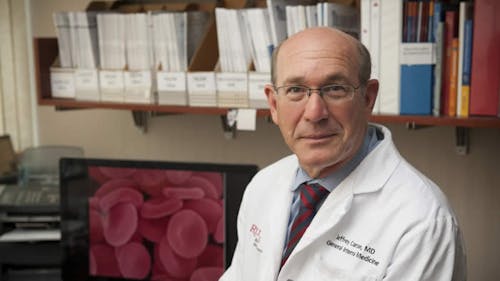Rutgers physician receives National Blood Foundation award

A Rutgers physician has recently been inducted into the National Blood Foundation Hall of Fame.
As the provost at Rutgers Biomedical Health Sciences, distinguished professor in the Department of Medicine, clinician at Robert Wood Johnson University Hospital and researcher, Jeffrey Carson holds many different roles in the medical field. While he spends time overseeing the care of adults and teaching, he also conducts research on blood transfusions, which led to his award.
Early in his career, Carson was working at a hospital in South Jersey for a bloodless medicine program, which takes care of patients who decline blood, mainly for religious reasons. While most of his patients did not require special treatment, he said some became severely anemic, to the point where their blood count was so low it was life-threatening.
Regarding religion, Carson said he wanted to respect his patients’ wishes on their preferences for treatment. His experience with the program inspired his later interest in research.
“It just led to my interest in the question of how low could you let patients go in their blood count before they would develop medical problems,” he said.
Carson started looking at hospital medical records, to compare patients who received blood with those who did not receive blood for certain medical issues such as heart failure. He then conducted clinical trials, a research technique where a group of patients are given a medical treatment according to an established protocol.
Using a coin flip, half of the patients received more blood and half received less. Some of the outcomes Carson looked for were whether they could care for themselves and which people developed more complications after being given their designated amount of blood.
His studies showed that patients who received less blood did just as well as those given more blood. To a certain extent, blood could be withheld from the patient and they would still be healthy, he said.
Carson was able to use his research to then publish new national guidelines for the use of blood transfusions. As part of a committee sponsored by AABB, a national blood organization, he and other experts in the field re-reviewed data and previous studies in order to create the revised guidelines.
“The guidelines provided recommendations … what we recommend other doctors do, how much blood they give,” he said.
In the past, doctors thought they needed to give more blood than necessary. Over the past 10 years, 30 percent less blood has been used due to Carson’s and other physician’s research, he said.
His current goal is to enroll more patients for his clinical trial. Currently, Carson said he had a quarter of the patients necessary and that when all patients are enrolled, it will gather information needed to further guide physicians in the use of blood transfusions and heart diseases.
“Doctors are not sure how to best use blood … I expect research will provide some of that key information to guide how to care for patients,” he said.



